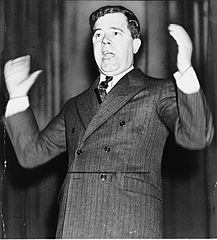Opposition to the New Deal
Although many people supported Roosevelt’s programmes of reform and recovery after the Great Depression, there was also opposition to the New Deal. There were those on the Left who argued that New Deal policy was not going far enough to reform society. On the other hand, politicians and businessmen on the Right argued that the New Deal gave government too many powers.
This opposition was reflected in a number of individuals and organisations. As a man from a wealthy background, the President was criticised by some of his peers for the fact that it was in fact the rich who were targeted by high taxes. Roosevelt was even reportedly excluded from his social club in the aftermath of the New Deal.
However, the most notable person who opposed the New Deal was a Senator from Louisiana called Huey Long. Huey Long represented, in its most extreme form, the fears of many leftist critics as well as New Dealers. Long like many others accused Roosevelt’s plans of not going far enough in the assistance of the poorest members of society. As such, Long created his own alternative to the New Deal which was called "Share Our Wealth".

Long came up the a promise that he would confiscate anybody’s personal fortune that exceeded $3 million and redistribute the wealth to American families. Long also promised further reforms including the introduction of pensions for the old, a new national minimum wage, and free education and cheap food.
Long practically controlled the state of Louisiana and he was far from a squeaky clean character. It is well known that any politician who opposed him would be suitably dealt with. For example, he bribed members of the police force to gain control of the law while it is also reported that local elections were heavily fixed so he could not lose. In the state he was known as the "Kingfish". Long’s popularity was not limited to the South - there were over 27,000 Share Our Wealth clubs nationwide with about 8 million members.
However, in 1935 he was killed. A bodyguard fired a shot at a man who was attempting to assassinated Long, but the bullet missed its target, instead ricocheting off of a corridor wall and hitting Long in the stomach. It is unlikely that Roosevelt would have attracted enough voters to the polls to beat Roosevelt in the 1936 election, but his huge popularity does highlight the concerns of many poor, agrarian Americans.
Although Huey Long never offered a feasible alternative, he highlighted flaws in the New Deal. Revisionist historians recognise these weaknesses and argue that the excessive business influence on the NRA; the lack of redistributive taxation and a flawed social security system limited the success of FDR’s New Deal.
Opposition to the New Deal also came in the form of Father Charles Coughlin. The Catholic priest had a radio show on which he attacked Roosevelt for the same reasons as Long had: not going far enough to help the poor. He also said that the president was “anti-God”.
He set up the National Union for Justice and teamed up with Dr. Francis Townsend. Townsend devised the Townsend Act - a proposal for state-funded pensions. These two teamed up with Gerald Smith, who had taken over as the successor to Huey Long as the senator of Louisiana, and together the trio planned to try and win over the poor voters.
The New Deal also faced a lot of opposition from the Supreme Court.
The Supreme Court judges were primarily Republicans. This meant that it declared many of the acts passed by FDR unconstitutional. In 1935 it effectively declared the National Recovery Administration (NRA) illegal. In the following year it declared the Agricultural Adjustment Act (AAA) unconstitutional. The point made by the Supreme Court was that any efforts made to help farmers should come at a state level and not federal level. It argued that the it went against the Constitution for federal government to take on so many powers. 11 out of the 16 Alphabet Laws were declared unconstitutional in cases heard by the Supreme Court.
The 1936 election result illustrate that both the New Deal and Roosevelt faced opposition. In November 1936, Roosevelt won the election comfortably, but there was still over a third of voters who stood against him; the president received 27 million votes while Alf Landon, Roosevelt’s Republican oppositions, received 16 million votes (37 per cent)
Roosevelt’s victory was still a landslide and was certainly recognised as such. After all, Maine and Vermont were the only two states that he lost. Nevertheless, the result indicate that a sizeable opposition still stood against him.
See also: Was the New Deal a Success
MLA Citation/Reference
"Opposition to the New Deal". HistoryLearning.com. 2026. Web.
